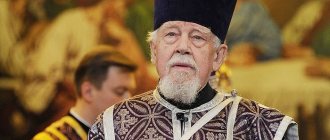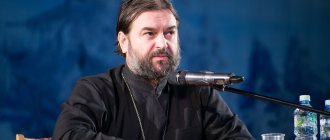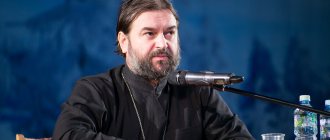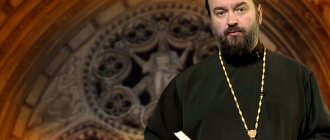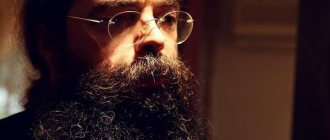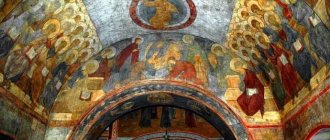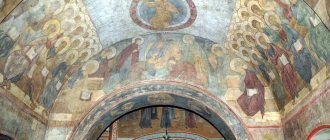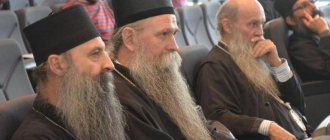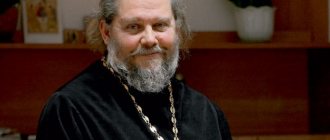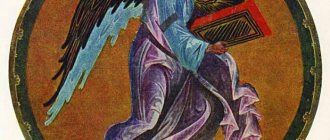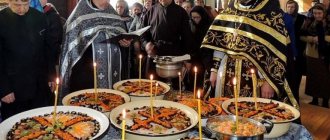Saint Andrew: Christian ascetics with this name
“Andrey” is a beautiful sonorous male name, translated from Greek meaning “courageous, brave.” From the word "άνδρας", meaning a man. It came to Rus' from Byzantium and began to quickly spread among the inhabitants after the adoption of Christianity.
Priest Artemy Vladimirov characterizes the meaning of this name with the following words:
“Every boy who received the name Andrei should, thanks to good upbringing on the part of his parents, teachers and mentors, pay special attention to such soul forces as courage, masculinity, courage. Male charisma does not imply cowardice and timidity, which have always been considered a sin in Russian families. Courage presupposes composure - the skill of keeping the mind calm , clear and active when surrounding reasons seem to want to unsettle a person. God grant that every man named after Saint Apostle would have a strong shoulder and be a true knight of Faith and Love.”
Apostle Andrew the First-Called
The apostle was from the Israeli village of Bethsaida, where, together with his brother, the future apostle Peter, he was engaged in fishing. He is called the First-Called because he was the first of Christ’s disciples to respond to His preaching and follow the Redeemer.
Holy Apostle Andrew the First-Called. Palekh icon painting workshop
After the descent of the Holy Spirit on the apostles, he preached the Gospel in Asia Minor, Thrace, Macedonia, Crimea and the Black Sea region. Then he climbed along the Dnieper to the place where the city of Kyiv is now located. His word turned entire tribes to the True Faith.
Archpriest Alexander Ageikin, rector of the Epiphany Cathedral in Yelokhov, says:
“For Russia, Apostle Andrew has a special meaning. According to Tradition, it was he who erected the first Cross on the Kyiv Mountains, where a city later appeared that became the Mother of Russian cities. And, since then, it is believed that this apostle is the patron of our land, and the Orthodox Faith was first preached in this territory by the Apostle Andrew.”
And professor of Church history Vladislav Petrushko adds:
“Rus' has always been very respectful of the memory of this saint. Peter I highly him . He declared the apostle the Patron of Russia and established the highest Russian order in his honor - the Order of St. Andrew the First-Called and the famous St. Andrew’s flag.”
Through the efforts of the apostle, Christian churches arose in the lands where he preached, in which he installed bishops and priests. The last place where Saint Andrew came to preach was the city of Patras. Here he performed many miracles, the most memorable of which was the healing of the wife of the city ruler, who later converted to Christianity.
Almost the entire population of the city turned away from paganism, however, among the remaining idolaters was the ruler Aegiatus. Angry, he ordered the righteous man to be crucified. A cross with diagonal crossbars, shaped like the letter “X,” was chosen for the execution. Since then, a similar cross has been called “Andreevsky”.
Interesting fact
Currently, in the Cathedral of Patras there is the head of the Apostle Andrew and part of the very cross on which he was crucified. In 2013, a piece of this cross was brought to Russia.
The Orthodox Church honors the memory of Saint Andrew the First-Called on December 13.
Andrey stratilat what they pray for
Saint Andrew lived at the beginning of the 4th century. He was a military tribune in the army of Emperor Maximian Galerius, which stood on the eastern borders of the Roman Empire. Although Andrei had not yet received holy baptism, he, like a rose among the thorns, stood out for his piety and valor.
The commander-in-chief Antiochus, known for his cruelty towards Christians, found himself faced with a sudden Persian invasion. Then he remembered the valiant Andrei and sent him at the head of a detachment to meet the enemies.
Before going into battle, Andrew urged his men to trust in Christ, who created heaven and earth and destroyed the power of false gods. Thus, unanimously calling on the name of Christ, they turned back the enemy troops and expelled them from the borders of the empire.
After this unexpected victory, Andrei's soldiers decided to turn to Christ. They were reported as Christians, and Antiochus, instead of justly rewarding the victors, called them to himself for trial. Alien to any sense of gratitude and burned with anger, he read the imperial edicts and recalled the names of noble Christians whom he had previously ordered to be executed. Andrew replied that in fact these Christian martyrs had won a victory over him and that the tortures to which he subjected them became trophies of victory for them in the Kingdom of Heaven. Then Antiochus, resorting to cruel ridicule, declared that it was necessary to give rest to such a man as Andrew, who had shown proof of great courage in battle, and ordered the saint to be stretched out on a red-hot bronze bed. The flame of faith and love that burned in the heart of the valiant martyr allowed him not to feel the burns, and he found true rest on this bed. Then they seized some of the warriors who had become famous in the battle with the stratilate, and nailed their hands to the crossbars. They endured the torture with a smile, rejoicing that they were participating in the Passion of our Lord Jesus Christ even before baptism.
As they remained unwavering in their decision, Antiochus ordered them to be imprisoned and wrote to the emperor, asking whether the valiant general should be put to death, thereby risking a mutiny in the army and an uprising of the people who considered him a hero. Maximian replied that he should secretly, with the help of cunning, get rid of him and in no way allow the new religion to penetrate the army.
Then Antiochus freed Andrew and his soldiers, pretending to allow them to go where they thought was right. The holy martyr, informed by God about this trick, went to Tarsus along with his people and asked Bishop Peter to baptize them. When Antiochus learned of their departure, he wrote to the commander of Cilicia, Seleucus, asking him to arrest them as quickly as possible and put them to death if they offered the slightest resistance.
Seleucus, also a fanatical persecutor of Christians, hastened to Tarsus with a significant detachment. Andrew and the soldiers, who had just been baptized, crossed the Taurus Mountains to escape persecution and headed to the Armenian city of Melitina. Seleucus did not stop searching and, with the help of a traitor named Martin, caught up with them in a gorge in the Taurus Mountains. As the soldiers prepared to rush at them, Saint Andrew called on his comrades to raise their hands in prayer, and not in order to swing their swords. Kneeling down, he prayed for a long time for the enemies and the salvation of the world. As soon as he finished the prayer, the soldiers rushed at them and began to kill them, like innocent lambs who offered no resistance.
According to the desire expressed by Saint Andrew in prayer, a healing spring gushed out at the place where he shed his blood. Peter, Bishop of Tarsus, and Nonus, Bishop of Beroea, who, together with other clergy, watched the martyrdom from afar, then came there and took care of the precious remains.
Compiled by Hieromonk Macarius of Simonopetra, adapted Russian translation by Sretensky Monastery Publishing House
When St. Andrew returned from the campaign with a victory, then many began to envy his glory and reported to the ruler Antiochus that the saint was a Christian who had converted his subordinate soldiers to Christ. The saint, summoned to trial, confessed Christ, for which he was subjected to torture. The soldiers who were with him were crucified on trees, but not one of them renounced Christ.
Then the emperor, fearing the indignation of the army, released St. Andrei and his squad, but secretly ordered, under some pretext, to execute each one separately. Having been freed, the saint and his soldiers came to the city of Tarsus, where they received Baptism, and then were killed in the Taurus Gorge. Before his death, Saint Andrew prayed for everyone who would honor their memory, and asked the Lord to send people a healing spring at the place where their blood would be shed. During this prayer, the martyrs were beheaded with a sword. And at the same moment a spring flowed out of the ground.
Bishops Peter and Non, who baptized the soldiers, together with the cleric buried the bodies of the martyrs. One of the clerics, who had been suffering from an evil spirit for a long time, drank from the spring and immediately received healing. Rumor about this spread among the surrounding residents, and they began to come to the source and through the prayers of St. Andrew and the 2593 martyrs received gracious help from God.
The martyrdom of the saints followed around 302.
See also: “The Suffering of the Holy Martyr Andrew Stratelates” as presented by St. Demetrius of Rostov.
Leaving your earthly dignity, / You inherited the Heavenly Kingdom, / With drops of blood, like wonderful stone, / You adorned incorruptible crowns / And you brought the passion-bearer to Christ. / From the faces of angels in the non-evening light / You found the unsetting Sun of Christ, / St. Andrew Stratilates,/ Pray to Him with those who suffered with you, // May He save our souls.
In the prayers of the Lord, / like a star that preceded the sun, / and you saw the desired treasure of the Kingdom, / filled with unspeakable joys. / To the Immortal King for endless ages, / praised incessantly by the Angels, eat, Andreas Stratilates, / / with them, pray unceasingly for everyone us.
Holy Martyr Andrew Stratelates, look down from the heavenly palace on those who require your help and do not reject our petitions, but, as our constant benefactor and intercessor, pray to Christ God, that He, loving and merciful, will save us from every cruel situation: from cowardice, flood , fire, sword, invasion of foreigners and internecine warfare. May he not condemn us, sinners, according to our iniquities, and may we not turn the good things given to us from the All-Bounteous God into evil, but into the glory of His holy name and into the glorification of your strong intercession. May the Lord, through your prayers, give us peace of mind, abstinence from destructive passions and all defilement, and may He strengthen throughout the world His One Holy Catholic and Apostolic Church, which He acquired with His Honest Blood. Pray diligently, holy martyr, may Christ God bless our power, may He establish in His Holy Orthodox Church the living spirit of right faith and piety, so that all its members, clean from superstition and superstition, worship Him in spirit and truth and diligently care about keeping His commandments May we all live in peace and piety in this present world and achieve blessed eternal life in Heaven by the grace of our Lord Jesus Christ, to Him belongs all glory, honor and power, together with the Father and the Holy Spirit, now and ever, and unto the ages of ages. Amen.
The autumn conscription is approaching - a time when many people come to Orthodox churches to pray for their loved ones entering military service. Who should I pour out my anxiety to, whose image should I give my son with me to the army? Of course - in addition to the Savior, the Mother of God, the Guardian Angel - the heavenly patrons of the army. Among them are those who are called stratilates (i.e. military leaders, since they were them in earthly life) - the Great Martyr Theodore Stratelates and the Martyr Andrei Stratelates. The memory of the latter is celebrated very soon - September 1 (new style).
To defend Syria
Martyr Andrew Stratilates was a military leader in the Roman armies during the era of Emperor Maximian. For his courage and justice, the saint was greatly loved by his subordinates and had authority among them. He had not yet been baptized, but he had in his heart an ardent love for Christ and zealously strived for what the Lord favored.
When a large Persian army invaded the borders of Syria, which at that time was one of the most important Roman provinces, Saint Andrew was entrusted with the leadership of the imperial army. At the same time, the Syrian ruler Antiochus awarded him the title of stratilate. The pious warrior chose a small detachment for himself, preferring it to larger forces. He remembered well the saying of King David that the Lord does not favor the speed of human feet, but shows mercy to those who trust in His will (cf. Ps. 146:10). The choice of the military leader fell on those whom the grace of God showed him through a mysterious action in the heart. Having thus gathered his squad, the stratilate marched with it against the enemies.
Cross trees and hot copper
His words were so convincing that the entire detachment - consisting, according to legend, of 2593 people - accepted this passionate sermon and rushed into battle, calling on the Savior for help. A difficult battle took place, as a result of which the Roman soldiers put the numerous Persian army to flight and returned home with the glory of the victors and with faith in Christ firmly established in their hearts.
The circumstances of this victory did not remain secret to the highest military nobility and prompted envious people to inform Antiochus, who was a cruel pagan, that the stratilate Andrew honors the Crucified God. The ruler sent envoys to the military leader with exhortations and threats, and then ordered him to be brought to trial. He offered the martyr a choice: to obey the royal command or endure torture, remaining with his God. In response, Saint Andrew only confirmed his faith in Christ. He himself lay down on the red-hot copper bed brought for torture and, enduring pain, turned to the Savior with a prayer. By a miraculous act of God, the hot metal immediately cooled down. Meanwhile, the warriors from the believing squad were crucified on trees, but not one of them renounced the Lord. Having imprisoned the saint, Antiochus sent a report to the emperor, not daring to put the famous winner to death himself. Maximian, fearing disturbances, gave the order to release the martyrs, secretly ordering, under some pretext, to execute them quietly, separately.
Without resisting the executioners
Having been freed, Saint Andrew and his retinue went to Cilicia (a historical region in the southeast of Asia Minor—Ed.). The warriors stopped in the city of Tarsus, where they were baptized by the local bishop, and then moved to the area of Taxanata. Antiochus wrote a letter to the ruler of the Cilician region, Seleucus, asking him to overtake the rebellious squad and exterminate it. Seleucus overtook the martyrs in the gorges of the Taurus, where, according to the Providence of God, they were destined to suffer.
At this difficult moment, Andrei Stratilat turned to the soldiers who were with him as brothers and urged them not to be afraid of death. He prayed for everyone who would honor their memory, and asked the Lord to send people a healing spring at the place where their blood would be shed. During this prayer, the martyrs, who did not offer resistance to Seleucus’s soldiers who caught up with them, were beheaded with a sword. Immediately after this, a transparent key actually came out of the ground. Bishops Peter and Non, who secretly followed the squad of Saint Andrew, buried the bodies of the slain soldiers. Meanwhile, one of the Church ministers accompanying them, who had been suffering from an evil spirit for a long time, drank water from the spring and was healed. This was the first posthumous miracle of St. Andrew. Word of what had happened spread among the surrounding residents, they began to come to the source and, through the prayers of the martyrs who suffered there, received gracious help from God.
The image of a courageous stratilate commander leading a squad into battle against the Persians of other faiths was invariably close to the Russian people who defended the faith and the Fatherland. On the day of memory of Andrei Stratelates, Moscow was freed from the invasion of the Crimean Khan Kazy-Girey; On this occasion, a wooden and then a stone church of St. Andrew was built in the capital. They pray to Andrew Stratelates, like other holy military leaders, for the needs of the Orthodox army. And also, like all saints, about intercession before God and help in spiritual life.
Prayer to the martyr Andrei Stratilat
Holy Martyr Andrew Stratelates, look down from the heavenly palace on those who require your help and do not reject our petitions, but, as our constant benefactor and intercessor, pray to Christ God, that He, loving and merciful, will save us from every cruel situation: from cowardice, flood , fire, sword, invasion of foreigners and internecine warfare. May he not condemn us, sinners, according to our iniquities, and may we not turn the good things given to us from the All-Bounteous God into evil, but into the glory of His holy name and into the glorification of your strong intercession. May the Lord, through your prayers, give us peace of mind, abstinence from destructive passions and all defilement, and may He strengthen throughout the world His One Holy Catholic and Apostolic Church, which He acquired with His Honest Blood. Pray diligently, holy martyr, may Christ God bless our power, may He establish in His Holy Orthodox Church the living spirit of right faith and piety, so that all its members, clean from superstition and superstition, worship Him in spirit and truth and diligently care about keeping His commandments May we all live in peace and piety in this present world and achieve blessed eternal life in Heaven by the grace of our Lord Jesus Christ, to Him belongs all glory, honor and power, together with the Father and the Holy Spirit, now and ever, and unto the ages of ages. Amen.
Prepared by Elena Sapaeva
Peter and Paul leaflet, No. 17 August 2016
Martyr Andrew Stratelates
Martyr Andrei Stratelates, Taurian
This saint was a Roman military leader (stratilate in Greek) during the reign of Emperor Maximian (285-305). He served in Syria, since he was from these places. He was a secret Christian, although unbaptized.
During the war with Persia, the emperor entrusted him with the advanced legions going to fight the enemy. Before the battle, Andrei addressed his soldiers with a fiery speech, saying that if they call on the True God - the Lord Christ - for help, they will win. The soldiers did so, and the Persian army was defeated.
However, upon returning to his homeland, envious people accused the saint of secretly practicing Christianity and reported him to the ruler. Stratilates was summoned to trial and asked to publicly renounce Christ. Seeing the steadfastness of the brave warrior, the king did not dare to execute him immediately, fearing the people's anger for killing a favorite who had won a glorious victory. He ordered Andrei to be killed secretly.
The saint, having received a revelation in a dream about the royal intention, left the city. 2,593 of his loyal warriors left with him. Arriving in the city of Tarsus, the legionnaires were baptized, and then went to the distant Armenian Mount Taurus. In one of the gorges of this mountain, the Roman army overtook the holy martyrs, dealing with the righteous who did not want to defend themselves.
Interesting fact
At the site of the shedding of the blood of these saints of God, a miraculous spring flowed, the water of which healed various ailments.
Memorial Day of the Martyr Andrei Stratelates of Tauria - September 1.
Holy Martyr Andrew Stratelates and the 2593 martyrs who suffered with him
Memory 19 August / 1 September
(MP3 file. Duration 4:21 min. Size 3.2 Mb) Read by Hieromonk Simeon (Tomachinsky)
Saint Andrew lived at the beginning of the 4th century. He was a military tribune in the army of Emperor Maximian Galerius, which stood on the eastern borders of the Roman Empire. Although Andrei had not yet received holy baptism, he, like a rose among the thorns, stood out for his piety and valor.
The commander-in-chief Antiochus, known for his cruelty towards Christians, found himself faced with a sudden Persian invasion. Then he remembered the valiant Andrei and sent him at the head of a detachment to meet the enemies.
Before going into battle, Andrew urged his men to trust in Christ, who created heaven and earth and destroyed the power of false gods. Thus, unanimously calling on the name of Christ, they turned back the enemy troops and expelled them from the borders of the empire.
After this unexpected victory, Andrei's soldiers decided to turn to Christ. They were reported as Christians, and Antiochus, instead of justly rewarding the victors, called them to himself for trial. Alien to any sense of gratitude and burned with anger, he read the imperial edicts and recalled the names of noble Christians whom he had previously ordered to be executed. Andrew replied that in fact these Christian martyrs had won a victory over him and that the tortures to which he subjected them became trophies of victory for them in the Kingdom of Heaven. Then Antiochus, resorting to cruel ridicule, declared that it was necessary to give rest to such a man as Andrew, who had shown proof of great courage in battle, and ordered the saint to be stretched out on a red-hot bronze bed. The flame of faith and love that burned in the heart of the valiant martyr allowed him not to feel the burns, and he found true rest on this bed. Then they seized some of the warriors who had become famous in the battle with the stratilate, and nailed their hands to the crossbars. They endured the torture with a smile, rejoicing that they were participating in the Passion of our Lord Jesus Christ even before baptism.
As they remained unwavering in their decision, Antiochus ordered them to be imprisoned and wrote to the emperor, asking whether the valiant general should be put to death, thereby risking a mutiny in the army and an uprising of the people who considered him a hero. Maximian replied that he should secretly, with the help of cunning, get rid of him and in no way allow the new religion to penetrate the army.
Then Antiochus freed Andrew and his soldiers, pretending to allow them to go where they thought was right. The holy martyr, informed by God about this trick, went to Tarsus along with his people and asked Bishop Peter to baptize them. When Antiochus learned of their departure, he wrote to the commander of Cilicia, Seleucus, asking him to arrest them as quickly as possible and put them to death if they offered the slightest resistance.
Seleucus, also a fanatical persecutor of Christians, hastened to Tarsus with a significant detachment. Andrew and the soldiers, who had just been baptized, crossed the Taurus Mountains to escape persecution and headed to the Armenian city of Melitina. Seleucus did not stop searching and, with the help of a traitor named Martin, caught up with them in a gorge in the Taurus Mountains. As the soldiers prepared to rush at them, Saint Andrew called on his comrades to raise their hands in prayer, and not in order to swing their swords. Kneeling down, he prayed for a long time for the enemies and the salvation of the world. As soon as he finished the prayer, the soldiers rushed at them and began to kill them, like innocent lambs who offered no resistance.
According to the desire expressed by Saint Andrew in prayer, a healing spring gushed out at the place where he shed his blood. Peter, Bishop of Tarsus, and Nonus, Bishop of Beroea, who, together with other clergy, watched the martyrdom from afar, then came there and took care of the precious remains.
From the book “Synaxarion: Lives of the Saints of the Orthodox Church,” published by the Sretensky Monastery Publishing House.
Compiled by Hieromonk Macarius of Simonopetra, adapted Russian translation by Sretensky Monastery Publishing House
Blessed Prince Andrei Bogolyubsky
Blgv.kn. Andrey Bogolyubsky
This saint was the son of Grand Duke Yuri Dolgoruky. Driven by the idea of creating a new state capital in the North-East of Rus', he secretly left his father's house in May 1155. And instead of a parental blessing, he took away from the convent in Vyshgorod the icon of the Mother of God, later called the Vladimir icon, painted by the Evangelist Luke himself during the life of the Mother of God. In his hands was the sword of the holy prince-martyr Boris. The deeply religious prince could not come to terms with the constant internecine strife tearing his native land apart, and wanted to create a new state - powerful, Orthodox, similar to Great Byzantium.
According to legend, not far from Vladimir, on the Klyazma River, a cart with a miraculous icon suddenly stopped, and no force could force the horses to move from this place. That night the Most Pure Virgin Herself appeared to the prince. She ordered to leave Her Image in Vladimir, and not to take it to Rostov, as Andrei wanted. The prince did not dare to disobey the Lady.
In the morning he took the icon to the Vladimir Cathedral and announced that this small town would now be the capital of his principality. On the site of the wondrous vision, he erected the Church of the Nativity of the Blessed Virgin Mary, where he often came to pray. Over time, a village appeared around the parish, which today bears the name Bogolyubovo.
Little by little, relying on faithful advisers, the prince turned Vladimir into a capital city, from where, according to his plan, autocratic power should spread throughout Rus', ending the civil strife tormenting the Russian lands. He drew the main principle from Byzantine books:
“There is one God in Heaven, one sovereign on earth!”
By reducing duties, he attracted the most eminent merchants and artisans to his lands. Ancient cities began to be decorated with new churches, the first of which in splendor was the Assumption Cathedral, specially erected for the Vladimir Icon of the Mother of God.
Interesting fact
Saint Andrew Bogolyubsky was the first of the Russian princes to clothe himself in purple - throne clothing in the manner of the Byzantine kings. He also organized palace rituals according to the Byzantine model.
It was Saint Andrew Bogolyubsky who first secured the trade route along the Volga and made it a great Russian river.
Vasily Tatishchev, a Russian historian, left the following description of the saint’s appearance:
“This prince was not tall, but broad-shouldered and strong. The hair is curly. He was courageous in battle. Lover of truth."
He fought with the Volga Bulgars. The chronicle reports about him:
«killed a lot of Bulgars. Took their banners. The Bulgarian prince and his small retinue barely managed to escape to his great city
».
The prince’s beloved son, Izyaslav, died in this campaign. In memory of him and in gratitude to God for the victory, the Church of the Intercession of the Mother of God on the Nerl was erected.
Subsequently, the prince subjugated Kyiv and Novgorod, but he was killed as a result of a boyar conspiracy in 1174.
Memorial Day of the Righteous Prince Andrei Bogolyubsky July 17.
Iconography[ | ]
In Byzantine icon painting there were several types of images of Andrew Stratilates. The most common type is a young martyr warrior in armor with dark hair and a small beard. In ancient Russian art, Andrei was usually depicted in military armor and a cloak, with a cross in his hand, with a short beard and curly hair streaked with gray; in temple paintings - usually on a pillar, full-length, with a spear, bow and shield.
In “Erminia” by Dionysius Furnoagrafiot about the appearance of Saint Andrew it is said “a curly-haired old man.” The icon-painting original of the 17th century, published by Sergei Bolshakov in 1903[1], indicates that he is “gray-haired, with curly hair, the braid of John the Evangelist, in armor, carrying greens, checkered armor, a robe of greens, azure underside, nagavits hook, in his right hand a cross, and in the left a copy, behind the left shield.”
Saint Andrew of Crete
Saint Andrew of Crete
The saint was born in Damascus. Until the age of 7, the boy was mute. His parents thought that he would remain like this for the rest of his life, but a miracle happened. At the age of 7, he was taken to communion for the first time, and, after partaking of the Holy Gifts, the boy’s tongue was freed from its binding bonds. The youth spoke.
Andrey studied many sciences. He became an excellent speaker. The parents brought their grown-up son to the Holy Sepulcher, dedicating him to God. The Patriarch of Jerusalem Theodore himself became the young man’s mentor. The future great ascetic learned a lot from him.
In 680, he was honored to be a participant in the Sixth Ecumenical Council, after which he remained to live in Constantinople, taking upon himself the feat of complete silence. However, the emperor soon became aware of his piety, and the saint, against his will, was appointed trustee of orphanages. Fulfilling this obedience, the saint showed himself so brilliantly in caring for the poor and orphans that he was soon elevated to the High Hierarchal Throne of the Metropolis of the island of Crete. It was this service that allowed him to become a great shepherd and teacher of the Church of Christ.
The saint of God left behind many written works. Including canons and troparia, which decorate holiday services today and evoke a feeling of tenderness in believers. He is also the author of the Great Penitential Canon, read in the first week of Great Lent.
The saint's prayer saved the island of Crete from the attack of barbarians. Despite the fact that the invaders were well armed, they hastily fled from the island without being chased by anyone. Many of them remained on its coast, finding eternal peace here.
The saint’s prayers helped avoid the plague epidemic. And, one day, the shepherd begged God for abundant torrential rain after a long, disastrous drought.
The saint reposed in about 740, foreseeing the day of his death in advance.
His memory was designated by the Church on July 17.
Rev. Andrei Rublev
Rev. Andrei Rublev
Little is known about this brilliant Russian icon painter. Born in the 60s of the 14th century, at a time when Rus' had been languishing under the Tatar yoke for a century and a half. It is not known what his name was in childhood, since Andrei is the second name of the saint of God, a monastic one.
Interesting fact
Ordinary people did not have surnames in those days. Rublev is a nickname. From the word “rubel” - a tool for processing leather.
Artists at that time worked in artels. One of the most famous artels painting temples was the artel of the brilliant icon painter Theophanes (Greek). Among his students was Andrei Rublev. The first mention of it can be found in the chronicle describing the construction of the Epiphany Cathedral in Moscow:
“ masters bykhu Feofan the icon painter Grechin and Prokhor the elder from Gorodets, and the monk Andrei Rublev.”
The saint went to paint churches in the Trinity-Sergius Lavra, in Vladimir he painted the Assumption Cathedral, in which the Vladimir princes were crowned kings. His depiction of the Last Judgment scene has been preserved here. This fresco is listed as a UNESCO World Heritage Site.
The greatest creation of the saint is the icon of the Holy Trinity, which represents the perfect artistic embodiment of Divine Love as the basis of the Universe. That Love, which is God. Only a person of high spiritual life, well acquainted with the Holy Scriptures and the works of the holy fathers, could write such a work.
Interesting fact
The peculiarity of this image, according to theologians, is that the Angels, personifying the Holy Trinity, occupy only three sides of the quadrangular table depicted on the icon, as if leaving the worshipers the opportunity to take the free fourth place and take part in the Sacrament of the Eucharist.
The icon painter reposed in Moscow, in the Spaso-Andronikov Monastery, on January 29, 1430. In 1988, the brilliant master was canonized.
The day of remembrance of St. Andrei Rublev is set on July 17.
BISHOP'S COMPOSITION TEMPLE OF THE HOLY APOSTLES PETER AND PAUL
The autumn conscription is approaching - a time when many people come to Orthodox churches to pray for their loved ones entering military service. Who should I pour out my anxiety to, whose image should I give my son with me to the army? Of course - in addition to the Savior, the Mother of God, the Guardian Angel - the heavenly patrons of the army. Among them are those who are called stratilates (i.e. military leaders, since they were them in earthly life) - the Great Martyr Theodore Stratelates and the Martyr Andrei Stratelates. The memory of the latter is celebrated very soon - September 1 (new style).
To defend Syria
Martyr Andrew Stratilates was a military leader in the Roman armies during the era of Emperor Maximian. For his courage and justice, the saint was greatly loved by his subordinates and had authority among them. He had not yet been baptized, but he had in his heart an ardent love for Christ and zealously strived for what the Lord favored.
When a large Persian army invaded the borders of Syria, which at that time was one of the most important Roman provinces, Saint Andrew was entrusted with the leadership of the imperial army. At the same time, the Syrian ruler Antiochus awarded him the title of stratilate. The pious warrior chose a small detachment for himself, preferring it to larger forces. He remembered well the saying of King David that the Lord does not favor the speed of human feet, but shows mercy to those who trust in His will (cf. Ps. 146 :10). The choice of the military leader fell on those whom the grace of God showed him through a mysterious action in the heart. Having thus gathered his squad, the stratilate marched with it against the enemies.
Cross trees and hot copper
Seeing the enemy's huge locust-like regiments in front of them, the warriors were close to being afraid and losing their fighting spirit. Being pagans, they worshiped idols. Saint Andrew invited his comrades to know the Almighty One God and turn to Him in prayer. “If you reject your vain gods,” he said, “you will see your enemies disappear like smoke or dust.”
His words were so convincing that the entire detachment - consisting, according to legend, of 2593 people - accepted this passionate sermon and rushed into battle, calling on the Savior for help. A difficult battle took place, as a result of which the Roman soldiers put the numerous Persian army to flight and returned home with the glory of the victors and with faith in Christ firmly established in their hearts.
The circumstances of this victory did not remain secret to the highest military nobility and prompted envious people to inform Antiochus, who was a cruel pagan, that the stratilate Andrew honors the Crucified God. The ruler sent envoys to the military leader with exhortations and threats, and then ordered him to be brought to trial. He offered the martyr a choice: to obey the royal command or endure torture, remaining with his God. In response, Saint Andrew only confirmed his faith in Christ. He himself lay down on the red-hot copper bed brought for torture and, enduring pain, turned to the Savior with a prayer. By a miraculous act of God, the hot metal immediately cooled down. Meanwhile, the warriors from the believing squad were crucified on trees, but not one of them renounced the Lord. Having imprisoned the saint, Antiochus sent a report to the emperor, not daring to put the famous winner to death himself. Maximian, fearing disturbances, gave the order to release the martyrs, secretly ordering, under some pretext, to execute them quietly, separately.
Without resisting the executioners
Having been freed, Saint Andrew and his retinue went to Cilicia (a historical region in the southeast of Asia Minor—Ed.). The warriors stopped in the city of Tarsus, where they were baptized by the local bishop, and then moved to the area of Taxanata. Antiochus wrote a letter to the ruler of the Cilician region, Seleucus, asking him to overtake the rebellious squad and exterminate it. Seleucus overtook the martyrs in the gorges of the Taurus, where, according to the Providence of God, they were destined to suffer.
At this difficult moment, Andrei Stratilat turned to the soldiers who were with him as brothers and urged them not to be afraid of death. He prayed for everyone who would honor their memory, and asked the Lord to send people a healing spring at the place where their blood would be shed. During this prayer, the martyrs, who did not offer resistance to Seleucus’s soldiers who caught up with them, were beheaded with a sword. Immediately after this, a transparent key actually came out of the ground. Bishops Peter and Non, who secretly followed the squad of Saint Andrew, buried the bodies of the slain soldiers. Meanwhile, one of the Church ministers accompanying them, who had been suffering from an evil spirit for a long time, drank water from the spring and was healed. This was the first posthumous miracle of St. Andrew. Word of what had happened spread among the surrounding residents, they began to come to the source and, through the prayers of the martyrs who suffered there, received gracious help from God.
* * *
The image of a courageous stratilate commander leading a squad into battle against the Persians of other faiths was invariably close to the Russian people who defended the faith and the Fatherland. On the day of memory of Andrei Stratelates, Moscow was freed from the invasion of the Crimean Khan Kazy-Girey; On this occasion, a wooden and then a stone church of St. Andrew was built in the capital. They pray to Andrew Stratelates, like other holy military leaders, for the needs of the Orthodox army. And also, like all saints, about intercession before God and help in spiritual life.
Prayer to the martyr Andrei Stratilat
Holy Martyr Andrew Stratelates, look down from the heavenly palace on those who require your help and do not reject our petitions, but, as our constant benefactor and intercessor, pray to Christ God, that He, loving and merciful, will save us from every cruel situation: from cowardice, flood , fire, sword, invasion of foreigners and internecine warfare. May he not condemn us, sinners, according to our iniquities, and may we not turn the good things given to us from the All-Bounteous God into evil, but into the glory of His holy name and into the glorification of your strong intercession. May the Lord, through your prayers, give us peace of mind, abstinence from destructive passions and all defilement, and may He strengthen throughout the world His One Holy Catholic and Apostolic Church, which He acquired with His Honest Blood. Pray diligently, holy martyr, may Christ God bless our power, may He establish in His Holy Orthodox Church the living spirit of right faith and piety, so that all its members, clean from superstition and superstition, worship Him in spirit and truth and diligently care about keeping His commandments May we all live in peace and piety in this present world and achieve blessed eternal life in Heaven by the grace of our Lord Jesus Christ, to Him belongs all glory, honor and power, together with the Father and the Holy Spirit, now and ever, and unto the ages of ages. Amen.
Prepared by Elena Sapaeva
Peter and Paul leaflet, No. 17 August 2016
Saint Andrew the Fool
Saint Andrew, Fool for Christ's sake
This saint was a Slav by birth. In his adolescence, he was captured and bought as a slave by the Constantinople nobleman Theognost during the reign of the Byzantine emperor Leo the Wise (866-912). Theognost fell in love with the beautiful young man and, seeing in him a sharp mind and curiosity, sent him to study book sciences.
Andrey really loved going to church. One day he was granted a vision of an Angel, who invited him to undertake the feat of foolishness in order to be able to openly expose people mired in sins. Having heeded the vision, Andrei decided to devote himself to this feat.
The young man pretended to be crazy. The saddened owner took him to the Church of St. Anastasia the Pattern Maker so that prayers would be read over him. When these actions did not help, reluctantly, Theognostus released him.
Andrei began to live as holy fools live. During the day he pretended to be a madman, and at night he prayed fervently. He lived in a field, had no clothes, ate what God sent him. At the same time, he gave away much of what people gave him to the poor, and did not like being praised for it. For such an ascetic life, the righteous man was granted the gift of clairvoyance and power over demons. He was awarded the vision of the Lord and the Heavenly Lady.
Interesting fact
Saint Andrew the Fool was honored to see the Most Pure Mother of God in the Blachernae Church of Constantinople, holding Her Honorable Omophorion over the inhabitants. In memory of that event, the Orthodox Church established the Feast of the Protection of the Mother of God, which is celebrated on October 14.
The righteous man reposed in 936.
The Church remembers the feat of Saint Andrew, Christ for the sake of the holy fool, of Constantinople on October 15 .
Excerpt characterizing Andrei Stratelates
“I’m unlikely to take advantage of your hospitality, gentlemen, and now it’s time for me to go,” Bolkonsky said, looking at his watch. - Where? - To the emperor. - ABOUT! O! O! - Well, goodbye, Bolkonsky! Goodbye, prince; “Come to dinner earlier,” voices were heard. - We are taking care of you. “Try to praise the order in the delivery of provisions and routes as much as possible when you speak with the emperor,” said Bilibin, escorting Bolkonsky to the front hall. “And I would like to praise, but I can’t, as much as I know,” Bolkonsky answered smiling. - Well, in general, talk as much as possible. His passion is audiences; but he himself does not like to speak and does not know how, as you will see. On the way out, Emperor Franz only gazed intently at the face of Prince Andrei, who stood in the appointed place between the Austrian officers, and nodded his long head to him. But after leaving yesterday’s wing, the adjutant politely conveyed to Bolkonsky the emperor’s desire to give him an audience. Emperor Franz received him, standing in the middle of the room. Before starting the conversation, Prince Andrei was struck by the fact that the emperor seemed confused, not knowing what to say, and blushed. – Tell me, when did the battle begin? – he asked hastily. Prince Andrei answered. This question was followed by other, equally simple questions: “Is Kutuzov healthy? How long ago did he leave Krems?” etc. The Emperor spoke with such an expression as if his whole goal was only to ask a certain number of questions. The answers to these questions, as was too obvious, could not interest him. – At what time did the battle begin? - asked the emperor. “I can’t tell your Majesty at what time the battle began from the front, but in Dürenstein, where I was, the army began the attack at 6 o’clock in the evening,” said Bolkonsky, perking up and at the same time assuming that he would be able to present what was already ready in his head a true description of everything that he knew and saw. But the emperor smiled and interrupted him: “How many miles?” - From where and to where, Your Majesty? – From Durenstein to Krems? - Three and a half miles, Your Majesty. -Have the French left the left bank? “As the scouts reported, the last ones crossed on rafts that night. – Is there enough fodder in Krems? – The fodder was not delivered in that quantity... The Emperor interrupted him. - At what time was General Schmit killed?... - At seven o’clock, it seems. - At 7:00. Very sad! Very sad! The Emperor said his thanks and bowed. Prince Andrei came out and was immediately surrounded on all sides by courtiers. Kind eyes looked at him from all sides and gentle words were heard. Yesterday's adjutant reproached him for not staying at the palace and offered him his home. The Minister of War approached, congratulating him on the Order of Maria Theresa, 3rd class, which the Emperor had bestowed upon him. The Empress's chamberlain invited him to see Her Majesty. The Archduchess also wanted to see him. He didn’t know who to answer, and took a few seconds to collect his thoughts. The Russian envoy took him by the shoulder, took him to the window and began to talk to him. Contrary to Bilibin’s words, the news he brought was received joyfully. A thanksgiving service was scheduled. Kutuzov was awarded the Grand Cross by Maria Theresa, and the entire army received decorations. Bolkonsky received invitations from all sides and had to make visits to the main dignitaries of Austria all morning. Having finished his visits at five o'clock in the evening, mentally composing a letter to his father about the battle and about his trip to Brunn, Prince Andrei returned home to Bilibin. At the porch of the house occupied by Bilibin, a britzka half-stuffed with belongings stood, and Franz, Bilibin’s servant, with difficulty dragging his suitcase, came out of the door. Before going to Bilibin, Prince Andrei went to a bookstore to stock up on books for the trip and sat in the shop. - What's happened? – asked Bolkonsky. - Ach, Erlaucht? - said Franz, with difficulty loading the suitcase into the chaise. – Wir ziehen noch weiter. Der Bosewicht ist schon wieder hinter uns her! [Ah, your Excellency! We go even further. The villain is already on our heels again.] - What is it? What? - asked Prince Andrei. Bilibin came out to meet Bolkonsky. There was excitement on Bilibin’s always calm face.
